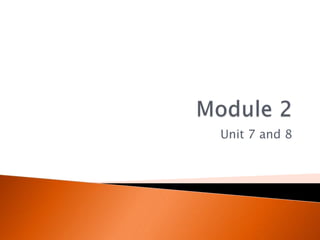
Forms of have to and possession
- 1. Unit 7 and 8
- 2. Form in the present: ◦ Positive: have to + verb/ has to + verb (he/she/it) ◦ Negative: don’t have to + verb / doesn’t have to + verb (he/she/it) Form in the past: ◦ Positive: had to + verb ◦ Negative: didn’t have to + verb When do we use it? Rule: We use have to to say ‘This is necessary’. We use don’t have to to say ‘This isn’t necessary’.
- 3. Positive: ◦ subject + have to / has to / had to + verb: He has to go to school today, it’s Monday. Negative: ◦ subject + don’t / doesn’t / didn’t + have to + verb You didn’t have to go to school two days ago.
- 4. Questions: ◦ Do / Does / Did + subject + have to + verb: Does he have to go to school today? He looks as white as a sheet. Short answers: ◦ subject + do(n’t) / does(n’t) / did(n’t) Do your parents have to go to work every day? – No, they don’t.
- 5. (present or past, positive or negative) 1. I … stay at home last night. 2. My parents … work last summer. 3. Jamie and Janine … do the ironing every week. Their mother does. 4. Lucy … learn Spanish from her parents. She hates it. 5. She … stay in Holland all summer because her parents wanted her to go to Spain to practice her Spanish.
- 6. (present or past, positive or negative) 1. I had to stay at home last night. 2. My parents had to work last summer. 3. Jamie and Janine doesn’t have to do the ironing every week. Their mother does. 4. Lucy has to learn Spanish from her parents. She hates it. 5. She didn’t have to stay in Holland all summer because her parents wanted her to go to Spain to practice her Spanish.
- 7. Mnemonic: ◦ Bij vragen en ontkennie (ontkenning) gebruik je geen ‘some’, maar ‘any’. Wanneer gebruik je het? Rule: With uncountable and plural nouns, we use some in positive sentences. We use any in negative sentences and questions.
- 8. Betekenis: enige, een paar Any: ◦ Vraag ? ◦ Ontkenning (NOT) Some: ◦ Bevestigend ◦ (Als het dus geen vraag en geen ontkenning is!)
- 9. 1. I haven’t got … paper 2. There aren’t … apples in the kitchen. 3. There is … milk left in the fridge. 4. Have you got … vegetables or should I go get groceries? 4. I’ve got … good ideas for the band.
- 10. 1. I haven’t got any paper 2. There aren’t any apples in the kitchen. 3. There is some milk left in the fridge. 4. Have you got any vegetables or should I go get groceries? 4. I’ve got some good ideas for the band.
- 11. This tea is for me It’s my tea This tea is mine This coffee is for you This is your coffee This coffee is yours
- 12. This hot chocolate is for him This is his hot chocolate This hot chocolate is his These drinks are for us These are our drinks These drinks are ours This cake is for them This is their cake This cake is theirs
- 13. 1. Here is (you / your / yours) tea. This one is (me / my / mine). 2. (Him / His) sister isn't very bright. 3. (Them / Their / Theirs) timetables are different from (us / our / ours). 4. Peter, where’s Matthew? Someone’s on the telephone for (his / him).
- 14. 1. Here is your tea. This one is mine. 2. His sister isn't very bright. 3. Their timetables are different from ours. 4. Peter, where’s Matthew? Someone’s on the telephone for him.